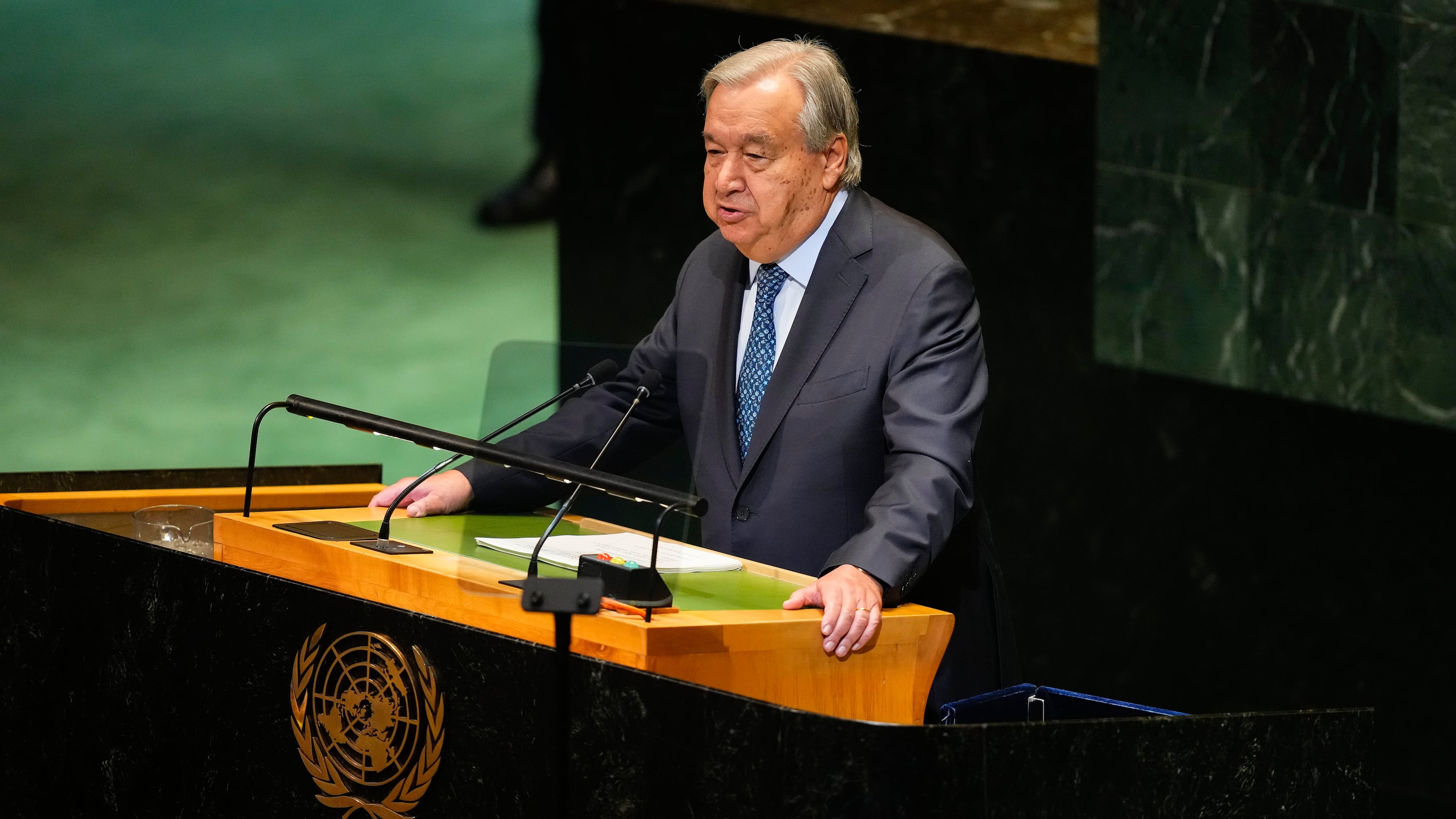UN chief warns world leaders of 'an age of reckless disruption and relentless human suffering'

UNITED NATIONS (AP) — The head of the United Nations warned Tuesday that humanity has entered “an age of reckless disruption and relentless human suffering” as world leaders convened at a moment in history rife with polarization, inequity and two major wars that have ignited anger across the planet.
“We have entered in an age of reckless disruption and relentless human suffering," Antonio Guterres said, opening the U.N. General Assembly's meeting, a week of speeches in which leaders and nations lay out their grievances, priorities and proposals about how to make things better.
Guterres said the world body’s principles “are under siege” as war, human misery and climate change threaten the planet. He said the U.N.’s member nations have a lot of work to do, even as “our ability to carry out that work is being cut from us.” He went on to point to conflict, hunger, “rising anger” and other ills.
The U.N. also is facing financial cuts as the U.S. and some other nations pulled back funding or have yet to pay their dues.
With global support for a Palestinian state growing, Israel’s devastating war in Gaza is expected to take center stage. But humanity's myriad conflicts, rising poverty and heating planet will also be in the spotlight.
Also on tap Tuesday: A speech from U.S. President Donald Trump, who has long made his distaste for much of the U.N.'s activities clear. His speech was expected to target “globalism” and, as in previous appearances, promote U.S. interests.
Israeli-Palestinian conflict takes center stage
The General Assembly ’s big week of meetings began Monday with events including a conference on the Israeli-Palestinian conflict. Tuesday kicks off the “General Debate” in which presidents, prime ministers, monarchs and cabinet members give their annual take on the state of the world and their own nations.
Brazilian President Luiz Inacio Lula da Silva, U.S. President Donald Trump, Turkish President Recep Tayyip Erdogan, Jordan's King Abdullah II, French President Emmanuel Macron, South Korea's President Lee Jae Myung and South African President Cyril Ramaphosa are among those scheduled to speak Tuesday. Brazil leads off in a decades-long tradition dating to when it was the only nation that volunteered to speak first.
Previewing a likely emphasis of the debate, General Assembly President Annalena Baerbock said Monday that the U.N. is at a crossroads.
“We cannot take the easy path and simply give up,” she said at an event marking the world body's 80th anniversary. “We have to choose the right path, to show the world that we can be better together — not because the last 80 years were perfect, but because for 80 years, we have tried.”
Geopolitical problems keep getting more complex
While the Debate's theme is “Better Together,” observers can expect a rundown of ways in which the world is falling apart.
Born on the rubble of World War II to bring nations together to solve problems they couldn't tackle alone, the U.N. is seeing its principles “under assault as never before,” Guterres said.
Gaza already has seized attention at the General Assembly. Monday's conference, co-chaired by France and Saudi Arabia, focused on garnering support for the longstanding idea of a two-state solution to the Israeli-Palestinian conflict.
The hours-long meeting ended with several countries, including France, Belgium, Luxembourg, Malta, and Monaco, announcing or confirming their recognition of a Palestinian state, a day after the United Kingdom, Canada, Australia and Portugal did. Others, such as Germany, Italy and Japan, took part in the conference but did not recognize such a state. Around three-fourths of the U.N.’s 193 member countries now do.
Notably absent were Israel and the U.S. They boycotted the event, saying the international push for a Palestinian state rewards Hamas, the militant group that still controls parts of Gaza, and makes it harder to reach a deal to halt the war and return the remaining hostages held in the enclave.
On Tuesday, many eyes will be on Trump, who returns to the Assembly rostrum five years after he last addressed the gathering by video. The 2020 event was held virtually because of the coronavirus pandemic.
The U.S. president's “America First” credo has always been a tricky fit with the U.N.'s commitment to global-scale shared decision-making, and his current administration has slashed Washington's direct spending on international aid, pulled his country out of some U.N. bodies and pulled some of the funding for the world organization itself.
Almost all U.N. member nations have signed up to take their turn during the Assembly's six-day-long speechfest. The speakers' list so far includes 89 heads of state, 43 heads of government, 10 people who are vice presidents or deputy prime ministers and 45 foreign ministers and other ministerial-level officials.
More Stories
The Latest
